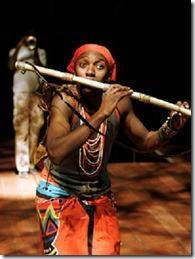
The Magic Flute
Written by Wolfgang Amadeus Mozart
Adapted and Directed by Mark Dornford-May
at Skyline Stage, Navy Pier (map)
thru Sept 28 | tickets: $20-$55 | more info
Check for half-price tickets
Read review
A rhythmically dramatic, one-of-a-kind Mozart experience
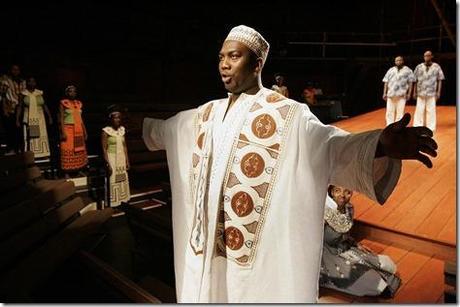
Isango Ensemble i/a/w Chicago Shakespeare presents
The Magic Flute (Impempe Yomlingo)
Review by Oliver Sava
Mozart’s The Magic Flute is arguably one of the most well known operas ever composed, but South African theater company Isango Ensemble offers an interpretation of the classic that is unlike any other. Music arrangers Pauline Malefane and Mandisi Dyantyis orchestrate the score for an orchestra of marimbas and various other percussion instruments, creating a dramatically different listening experience that adds both a breezy lightness and haunting hollowness to the notes. There’s also a physical aspect of playing the marimbas that makes this production highly active, even when there’s no story unfolding on stage.
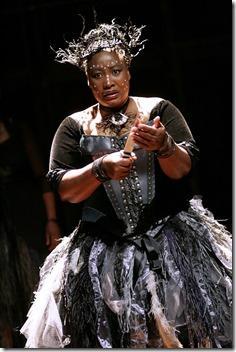
Those familiar with the story of Mozart’s opera will recognize characters like the young prince Tamino (Mhlekazi “Whawha” Mosiea), the beautiful princess Pamina (Bongiwe Mapassa), and the bawdy bird catcher Papageno (Luvo Rasemeni), but they’ve been reimagined as citizens of contemporary South Africa in Mark Dornford-May’s adaptation. Leigh Bishop’s costumes reflect the new setting and time period, and relocating the story has a direct impact on the music, which often uses Mozart’s score as a starting point before moving on to more rousing sections embracing the rhythm of traditional African beats.
Dornford-May’s adaptation is performed in a variety of languages, primarily in English, but also Xhosa, Tswana, and Zulu. There are plot summaries posted in the lobbies as well as in the programs, making sure that the audience knows what is happening on stage because there are no supertitles, and the production doesn’t always make the plot especially clear. The emotion of the scenes comes across—primarily because the score is so good at capturing that aspect of the music—but it can be very difficult to hear the actual lyrics. The Skyline Stage is a very large space that requires intense articulation, and many of the words get lost, especially when the entire orchestra is backing the performers.
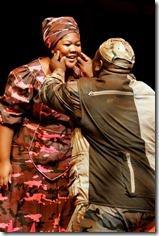
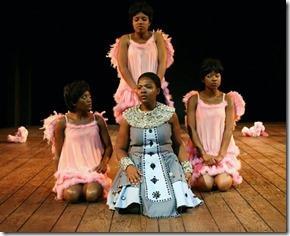
The easiest solution to this problem would be to use supertitles, but the director clearly wants all the attention on his performers rather than the text floating above them. This production requires a lot of focus from the viewer in order to make out the finer details of the action, and it’s refreshing to see a company that trusts the audience to accept a challenge and rise above it. Much of this script isn’t going to be understood by anyone that doesn’t have a familiarity with the languages of South Africa, making music the universal language that translates the events in a way that anyone can comprehend on a primal level.
The language barrier makes it a bit difficult to settle in to the first act, but events become progressively clearer as the production continues. The second act delivers the biggest thrills, from the iconic aria performed by the Queen of the Night (a searing Siyasanga Mbuyazwe) to the breathtaking finale, which explodes in a rush of percussion, dance, and song that fills the theater with an overwhelming feeling of celebratory joy. The finer details of the story may be lost in translation, but Isango Ensemble more than makes up for that fault by delivering a one-of-a-kind musical experience, fully immersing the audience in another world through the power of sound.
Rating: ★★★
The Magic Flute continues through September 28th at Navy Pier’s Skyline Stage, 600 E. Grand (map). Tickets are $20-$55, and are available by phone (312-595-5600) or online through their website (check for half-price tickets at Goldstar.com). More information at ChicagoShakes.com. (Running time: 2 hours 15 minutes, includes an intermission)
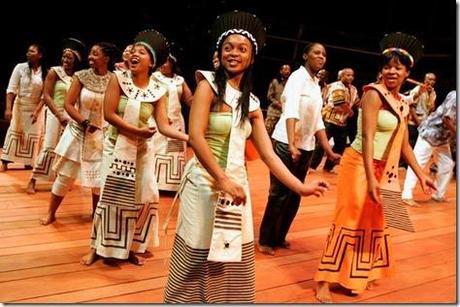
Photos by Keith Pattison and Ruphin Coudyzer
artists
cast
Noluthando Boqwana (Spirit), Mandisi Dyantyis (Conductor), Thobile Dyasi (Monostatos), Ayanda Eleki (Sarastro), Zamile Gantana (Papgeno), Nontsusa Louw (Lady 1, Papagena), Sifiso Lupuzi (Armed Man), Pauline Malefane (Queen of the Night), Bongiwe Mapassa (Pamina), Zanele Mbatha (Company), Siyasanga Mbuyazwe (Queen of the Night, Papagena), Sinethemba Mdena (Monostatos), Zebulon Mmusi (Priest), Mhlekazi “Whawha” Mosiea (Tamino), Zoleka Mpotsha (Spirit), Siyanda Ncobo (Lady 3), Cikizwa Ndamase (Lady 2), Zolina Ngejane (Pamina), Busisiwe Ngejane (Spirit), Sonwabo Ntshata (Tamino), Tukela Pepeteka (Armed Man), Luvo Rasemeni (Papageno), Masakane Sotayisi (Company), Ayanda Tikolo (Sarastro)
behind the scenes
Mark Dornford-May (adapter, director), Pauline Malefane, Mandisi Dyantyis (music arrangers), Lungelo Ngamlana (choreographer), Leigh Bishop (costume design), Mannie Manim (lighting design), John Page (production manager), Maris Sharp (company manager), Sandile Mgugunyeka (stage manager), Valencia Mgugunyeka (stage manager), Keith Pattison, Ruphin Coudyzer (photos)
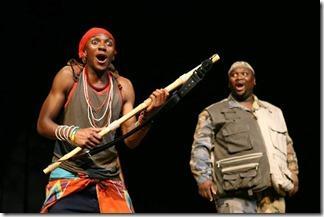
14-0950

